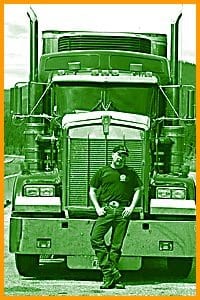Truckers don’t talk too much about gay stuff – but that doesn’t stop Tim Anderson. He’s unabashed about his sexuality and his love of trucks and rodeos, and he declares it on his website, too.
“We had no idea what kind of response we’d get, but it was overwhelming. It was over a year before I got my first death threat,” Anderson says nonchalantly from his home in northeastern Washington State.
While many professional and management workers have crossed the threshold, the same is not true for the trades and labouring classes. Blue collar workers, and truckers specifically, are antsy about declaring their homosexual orientation.
“How many gay truckers do you know?” Anderson asks. “You probably know many. When I started trucking in ’86-’87, I thought I was the only one. Now I know hundreds of drivers out there. There have been times that there were five or six of us running down the road and nobody would know the difference, except we’re on a different [CB] channel.”
The trucker channel from Ontario westward is 19 (in the Atlantic provinces it’s 1, and French truckers usually use 12 or 10). Truckers will most often contact each other on 19 and then shift to an open channel if they want to carry on a conversation.
“Some truckers have come to associate 29 as the gay channel, but I’ve only heard bigots and nuts on it, and some have tried to establish channel 22 as the gay one, but I doubt it will ever fly,” says Anderson. “It’s such a crapshoot to find someone heading the same way, within range, who happens who happens to venture off of Sesame St.” Sesame St is the nickname for the the main channel everyone is on.
Besides a stint as a student at a Lutheran Christian College, much of Anderson’s adult life has been spent behind the wheel (he’s 36). He’s been running long haul for 16 years – for 10 of those Anderson ran as a team with his partner, who was also his co-driver.
That amount of intensity can put a strain on a relationship.
“It’s hard to feel romantic when your better half is covered in diesel fuel, because you, his trusted partner, just lost a cross-over [fuel] line in an Iowa blizzard.”
There’s also a Canadian connection. At one time, Anderson and his co-driver ran “salad” (produce) between California and Edmonton for an Alberta boss.
“He thought we were perfect for the job, all the right experience. His wife figured out we were gay before he did. But he told us straight out that he might not hire us because of that. At least he dealt with it unlike most people. As it turned out, we became his number one produce-hauling team.”
Anderson’s academic credentials are also in order. He’s recently finished a collaboration with a professor from Pacific University on trucker languages, specifically the way chicken haulers talk to each other.
The term “good buddy,” once a popular way of addressing another male driver (after movies like White Line Fever, Convoy, and anything with Clint Eastwood and a monkey) is pejoratively used to mean gay trucker. You don’t call a straight macho trucker a “good buddy” unless you’re looking for a fist in the chops.
Truckers are not subtle when discussing sex. But they can get downright ugly when talk turns to “queers” on the CB radio – from mindless tittering, to discomforting rhetoric, to particularly violent reactions flavoured with homoerotic subtext. Thus, gay truckers have evolved a specialized way of communicating, “a language within a language,” according to Anderson.
“It’s a very hidden segment of society, and it’s probably better it stays that way.”
According to Anderson, a gay trucker will use gaydar to find out if a fellow trucker is sympathetic or interested. That is, they’ll start talking and dropping subtle hints. If the respondent is not gay, he won’t notice the innuendo.
Anderson also thinks that AIDS and truck drivers is being ignored by government. “They don’t even want to know about it,” he says. Recently, the trucker-come-writer has been working with a researcher from the University Of Arizona.
“She’s trying to correlate whether the risky appeal of a dangerous career like trucking is also something that encourages risky sexual behaviour. Among drivers especially.”
Anderson ran with an HIV-positive co-driver and says it was difficult to connect with prescription meds as the pair travelled across the country. The US Department Of Transport, which expects drivers to supply random urine samples to determine if they have smoked pot in the last month or taken cocaine or opiates in the last few days, has nothing say about HIV and trucking.
A single driver does up to 600 miles a day, sometimes more.

 Why you can trust Xtra
Why you can trust Xtra


